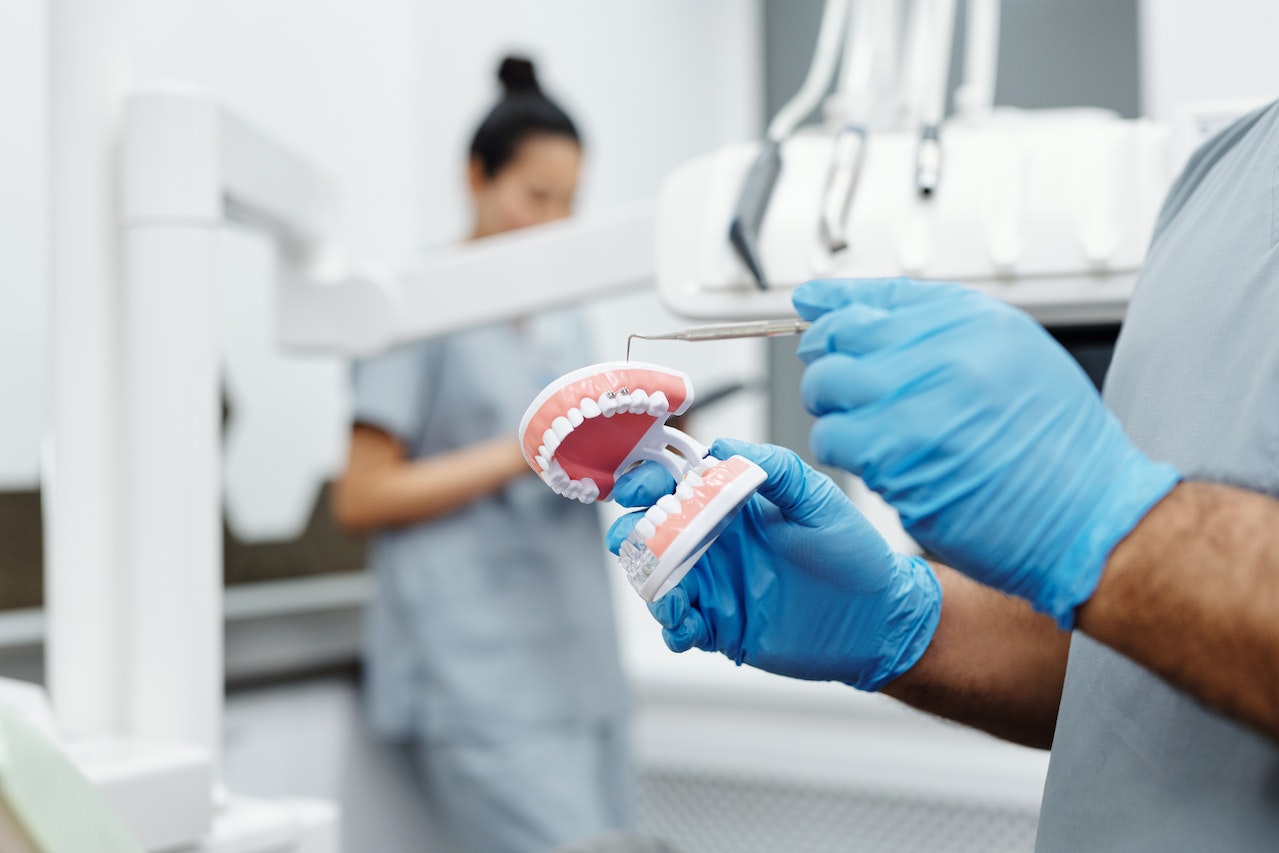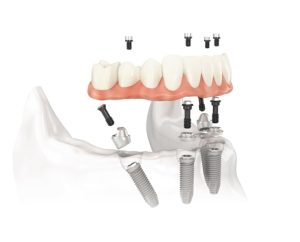
24 Aug What You Need to Know Before Getting Full Mouth Tooth Replacements
The replacement of a full arch of teeth is a revolutionary dental implant option for individuals who have lost multiple teeth. It offers a long-lasting and natural-looking solution that can restore both the function and aesthetics of the mouth. This treatment utilises only four dental implants to support a full set of fixed replacement teeth, making it an efficient and cost-effective alternative to traditional methods such as removable dentures or individual implants.
Imagine you’re someone who has lost several teeth or has experienced significant tooth decay, affecting the ability to eat, speak, and smile with confidence. The full-mouth dental implant treatment, also known as All-on-4, could provide a life-changing solution by giving you a brand new set of teeth anchored securely in your mouth through four implants. This means no slipping or discomfort associated with dentures, and you can enjoy your favourite foods and engage in socia l interactions without worrying about your teeth.
l interactions without worrying about your teeth.
Now, it’s important to address any concerns or doubts you may have before considering this treatment option. Some people may wonder if getting all their teeth replaced at once is the right choice for them. While each case is unique, it’s essential to understand that the full arch implant treatment offers numerous benefits. It can improve oral health, enhance speech, restore facial harmony, and boost self-confidence. Its success rate is high, but it’s always recommended to consult with an experienced dentist who can evaluate your specific needs and guide you toward the most suitable treatment plan.
How Does the Procedure Work?
The full-mouth implant procedure typically involves a series of steps led by a skilled dental team experienced in implant dentistry. Before initiating treatment, thorough assessments including digital X-rays are conducted to evaluate bone density, gum health, and ascertain the most suitable implant placement.
Once you’re deemed a suitable candidate for full-arch implant treatment, any remaining teeth in the arch are removed, and any necessary preliminary treatments such as extractions or bone grafting are performed. This paves the way for the next stage where dental implants are strategically placed in the jawbone.
Imagine this step as constructing a sturdy foundation for a building. Just like workers carefully placing pillars in precise locations to support the structure, dental implants are surgically inserted into the jawbone at specific angles and positions to maximise stability and support for the prosthetic teeth.
Following this, a temporary set of teeth is attached to the implants, allowing you to leave the clinic with functional teeth even during the healing phase. This temporary phase gives your implants time to osseointegrate with your jawbone, creating a strong bond that ensures long-term stability and functionality.
In the final phase of the treatment, after sufficient healing has occurred, impressions of your mouth are taken to create customised fixed replacement teeth that will fit seamlessly and comfortably in your mouth. These replacement teeth are crafted using high-quality materials that mimic the appearance and function of natural teeth.
Important Considerations Before Opting for Full Arch Implants
Embarking on any dental procedure requires careful consideration and informed decision-making, and the same applies when getting a full upper or lower dental implant replacement. Before opting for this innovative dental implant technique, it is crucial to keep certain factors in mind.
First and foremost, you need to evaluate your overall oral health. Full mouth implants involve the placement of four dental implants to support a full arch of teeth. This procedure is suitable for individuals who have experienced significant tooth loss or those with severely damaged teeth. However, a thorough assessment is essential to determine if you are a suitable candidate for this procedure.
For instance, if you have advanced gum disease or insufficient bone density in the jaw, alternative treatment options may need to be explored. Your dentist will conduct a comprehensive examination, including X-rays and scans, to establish whether a full arch replacement is appropriate for you.
Another important consideration is the recovery period after the surgery. Full arch tooth replacement involves surgical placement of implants, which requires adequate healing time before the final restoration can be attached. During the initial healing phase, you may experience some discomfort, swelling, and temporary dietary restrictions. It is crucial to discuss these aspects with your dentist andensure that you have a clear understanding of what to expect during the recovery period.
Moreover, understanding the long-term commitment involved in maintaining full arch implants is vital. While these prosthetic teeth can provide an excellent solution for missing teeth, they require regular care and maintenance. Good oral hygiene practices such as brushing, flossing, and regular dental check-ups are integral to ensuring the longevity of your implants and overall oral health.
Evaluating Finances and Insurance
When considering any dental procedure, including full teeth replacement, evaluating your finances and understanding your insurance coverage is crucial. This will help you plan for the financial aspects of the treatment and make informed decisions.
The cost of full dental implants varies depending on factors such as the location of the dental practice, the complexity of your case, and additional treatments required. It is essential to consult with your dentist and discuss the estimated cost of the procedure, including any associated fees for consultations, imaging, and aftercare.
Some dental practices offer payment plans or financing options to help spread out the cost of treatment over time. These options can make full tooth replacement more affordable and manageable for individuals concerned about upfront costs.
In terms of insurance coverage, it is important to reach out to your dental insurance provider to understand what aspects of full arch implants may be covered. Dental insurance plans often have limitations and exclusions for certain procedures or may cover only a portion of the overall cost. Having a clear understanding of your insurance benefits will allow you to anticipate potential out-of-pocket expenses.
Think of evaluating finances and insurance coverage for full teeth replacement, like conducting thorough research before making a significant financial investment. It’s important to gather information, explore options, and have a realistic understanding of what you can afford.
Dealing With Potential Complications
While dental implant technology is highly advanced and has a high success rate, it’s important to be aware of potential complications that can arise. One possible issue is implant failure, which can occur due to poor osseointegration or gum disease. In such cases, additional procedures may be required to salvage the situation.
Another complication is infection at the implant site. This can happen if proper oral hygiene practises are not followed or if there is an underlying oral health condition. It’s crucial to closely follow your dentist’s instructions regarding aftercare and seek prompt treatment if you notice any signs of infection.
Additionally, some individuals may experience discomfort or sensitivity following the full arch implant procedure. This should gradually subside as your mouth adjusts to the implants. However, if the discomfort persists or worsens over time, it’s important to consult with your dentist to rule out any underlying issues.
Communication with your dentist is paramount throughout this entire process. They are there to help guide you through any complications that may arise and provide suitable solutions tailored to your specific needs. Remember that each individual’s case is unique, so it’s important not to compare your progress or recovery with others.
By staying vigilant, adhering to aftercare instructions, and maintaining regular check-ups, you can minimise the risk of complications and ensure the long-term success of your dental implants.
How long does the full arch implant procedure take?
The procedure typically takes about 2 to 3 hours per arch, allowing for immediate implant placement and a faster overall treatment time compared to traditional dental implant procedures. This technique involves the placement of only four implants per arch, which helps streamline the process and reduces healing time.
How much do full-mouth dental implants cost?
The cost of full-arch dental implants can vary depending on several factors, such as the location of the dental practice, the expertise of the dentist, and the materials used for the implants. On average, the cost of full-arch dental implants in Sutherland Shire ranges from $22,000 to $40,000 per arch. It’s important to note that this estimate doesn’t include additional fees for extractions, bone grafting, or other necessary procedures. However, considering the long-term benefits and improved quality of life that full-mouth implants offer, they are often regarded as a worthwhile investment in terms of both aesthetics and functionality.
What is the success rate of dental implants?
The success rate of the full arch dental implant procedure is generally high, with success rates around 95-98%. This procedure has proven to be a reliable and effective solution for replacing multiple missing teeth. The success can be attributed to the strategic placement of four dental implants on each arch, providing stability and support for a full set of teeth. Additionally, advancements in implant materials and techniques have further improved the long-term success of dental implants, making them an increasingly popular choice for restoring a confident smile.
What is the expected recovery time for full-arch dental implants?
The expected recovery time for full arch dental implants is usually around 2-3 months. During this period, patients may experience some swelling and discomfort which can be managed with pain medication. It is important to follow a soft food diet and avoid biting down on hard or chewy foods during the initial healing phase. According to a study published in the Journal of Prosthodontics, the success rate of full arch implants after 3 years is approximately 94%, indicating a relatively high level of patient satisfaction and long-term stability.


